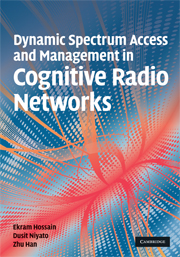Book contents
- Frontmatter
- Contents
- Preface
- Part I Introduction
- Part II Techniques for design, analysis, and optimization of dynamic spectrum access and management
- Part III Dynamic spectrum access and management
- 7 Dynamic spectrum access: models, architectures, and control
- 8 Centralized dynamic spectrum access
- 9 Distributed dynamic spectrum access: cooperative and non-cooperative approaches
- 10 Distributed dynamic spectrum access: learning algorithms and protocols
- 11 Economics of dynamic spectrum access: spectrum trading
- 12 Economics of dynamic spectrum access: applications of spectrum trading models
- References
- Index
11 - Economics of dynamic spectrum access: spectrum trading
from Part III - Dynamic spectrum access and management
Published online by Cambridge University Press: 26 February 2010
- Frontmatter
- Contents
- Preface
- Part I Introduction
- Part II Techniques for design, analysis, and optimization of dynamic spectrum access and management
- Part III Dynamic spectrum access and management
- 7 Dynamic spectrum access: models, architectures, and control
- 8 Centralized dynamic spectrum access
- 9 Distributed dynamic spectrum access: cooperative and non-cooperative approaches
- 10 Distributed dynamic spectrum access: learning algorithms and protocols
- 11 Economics of dynamic spectrum access: spectrum trading
- 12 Economics of dynamic spectrum access: applications of spectrum trading models
- References
- Index
Summary
To design efficient and effective dynamic spectrum access techniques for a cognitive radio network, the related technical aspects (e.g. channel allocation, power control) as well as economic aspects (e.g. pricing, spectrum auction) need to be considered. The economic issues are crucial for cognitive radio networks operating under the exclusive-use spectrum access model, since they define the incentive for licensed users to yield the right of spectrum access to the unlicensed users. Economic issues are also important for dynamic spectrum access based on the shared-use and commons-use models, because they determine the competition and cooperation between the licensed and unlicensed users.
In this chapter, we describe the different economic aspects of dynamic spectrum access in cognitive radio networks. First, the concept of spectrum trading is presented, which involves spectrum selling by single or multiple licensed users and spectrum buying by unlicensed users. A taxonomy of the spectrum trading models is presented. The pricing issue for spectrum trading as well as authentication, authorization, and accounting (AAA) issues are discussed. Then, an overview of the economic theories for spectrum trading in a dynamic spectrum access environment is given. These include utility theory, the concept of market-equilibrium, competition in an oligopoly market, and auction theory. A survey on the spectrum trading models based on the above theories is then presented.
Introduction to spectrum trading
Generally, license for spectrum access is provided to a primary user or service provider through an auction process in a primary market (Figure 11.1). When the allocated spectrum is under-utilized, the licensed user can lease the spectrum in a secondary market to an unlicensed user which temporarily demands the spectrum for a particular service.
- Type
- Chapter
- Information
- Publisher: Cambridge University PressPrint publication year: 2009



